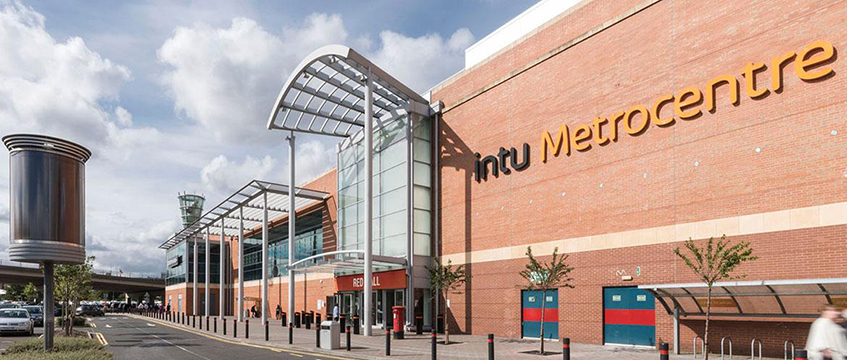Intu pins its hopes on cash call – but will it be enough?
Debt-laden shopping centre landlord intu has confirmed it is in talks with Hong Kong property giant Link REIT, among other shareholders, on supporting its £1bn emergency cash call.
The Hong Kong company would be a new, “cornerstone” investor in the fundraising later this month. John Whittaker’s Peel Group, which owns 27.3% of intu, is also expected to back the raise, which will be unveiled alongside intu’s full-year results.
Consequently, its share price has enjoyed a much-needed recovery – up 25% from 13.4p at the end of trading last week to around 16.7p this morning.
Debt-laden shopping centre landlord intu has confirmed it is in talks with Hong Kong property giant Link REIT, among other shareholders, on supporting its £1bn emergency cash call.
The Hong Kong company would be a new, “cornerstone” investor in the fundraising later this month. John Whittaker’s Peel Group, which owns 27.3% of intu, is also expected to back the raise, which will be unveiled alongside intu’s full-year results.
Consequently, its share price has enjoyed a much-needed recovery – up 25% from 13.4p at the end of trading last week to around 16.7p this morning.
The equity raise is designed to help fix intu’s balance sheet and tackle its debt load. But how far can it go in addressing these issues?
Will a raise solve intu’s problems?
So far in its cash-raising efforts in recent months, intu has sold two of its three Spanish shopping centres: Intu Asturias in Oviedo, which generated €85m (£72m) proceeds, and Intu Puerto Venecia in Zaragoza (€115m). Proceeds from the sale of Asturias reduced loan-to-value by around 1%.
But market sources broadly hold the view that its disposals, on top of a £1bn raise, may not be enough for intu to get on top of its £4.7bn debt pile in the long run.
In the short term, £1bn of equity may be able to reduce its LTV back down to around 50%, from the 57.7% that it reported for its third quarter ending 5 November 2019.
But the ongoing drop in values signals that this could be relatively short-lived. Declining values triggered a covenant within its £485m bonds against intu Metrocentre last month, after its LTV exceeded the 70% maximum.
Since it is largely perceived to be one of intu’s higher-quality properties, a significant writedown is therefore expected to hit the rest of its portfolio.
Matters are not helped by the complex nature of intu’s debt arrangements, which are largely asset-specific and consist of bank debt, CMBS, bonds, convertibles and debentures.
Intu may therefore need to consider a separate debt restructuring alongside its proposed equity raise, to avoid the risk of confining its cash to the lower parts of its corporate structure.
All REIT now
The landlord has already halted dividend payments – a move that could call its REIT status into question.
It has so far steadfastly stuck to a REIT regime, since it means it is exempt from corporation tax, so long as it pays 90% of its taxable income in dividends back to shareholders.
But with rents continuing to erode from the onslaught of store closures and rent cuts, a return to dividends is looking increasingly unlikely.
A bid to take the company private, on the other hand, would have the benefit of avoiding the extra scrutiny that comes with being a listed company. A private owner would also gain more flexibility when it comes to selling or refinancing its portfolio.
“Intu’s insistence on remaining a REIT through a period of substantial value erosion and operational headwinds makes little sense to us,” wrote analysts at Numis in a broker note earlier in February, seen by EG.
“Arguably, intu’s commitment to the REIT structure makes little more sense than its decision to remain publicly listed. After all, UK institutional investors have always been in the minority on its shareholder register and we see little scope for this changing. As a private co, it would have the ability to operate with much higher levels of leverage than are acceptable in public markets without the same level of scrutiny to which it is currently subjected.”
At this point, it does not seem outlandish to assume that Peel might still consider a bid for the company to be more beneficial than forking out £200m-£300m to back the raising.
Coronation Group, another major shareholder, has been quietly trimming down its stake from around 17% to just under 11% in recent months, throwing its intentions into question.
Sources have also speculated that Orion Capital, which has a stake of around 10% in intu, may not support the raise.
Orion has been building up its share of the business since January last year, but it is estimated that it has since made a loss of roughly £100m, as share prices have fallen from around 112p when Orion bought in.
Much, then, rests on intu’s ability to attract new investors to the raising, such as Hong Kong’s Link.
Link to the rescue?
Link, which has a market cap of around £16bn, owns 126 properties across its native market and mainland China, including retail, offices and car parks.
It has historically outlined its intention to opportunistically expand in the UK as well as in Australia, Singapore and Japan.
Its properties in Hong Kong are largely connected to residential and public housing estates, in a mixed-use strategy that broadly aligns with the mindsets of many shopping centre landlords in the UK.
The REIT’s first foray into the Australian market in December – 100 Market Street, an A$638m (£330m) central office tower in Sydney – is an encouraging sign of things that may come.
To send feedback, e-mail pui-guan.man@egi.co.uk or tweet @PuiGuanM or @estatesgazette











